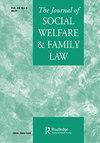在撤销收养安置令的休假申请中平衡的艺术
IF 0.9
Q2 LAW
引用次数: 0
摘要
法院在申请撤销收养安置令时应该采取什么方法?一方面,采取慷慨的休假方式会导致程序延误,这可能会降低孩子成功安置的机会(Doughty等人,2019,第5页)。另一方面,采取严格的方法会干扰父母对安置令提出质疑的权利,并与“决不能为了速度而损害正义”的格言相冲突(Gupta和Lloyd-Jones,2016,第546页)。有鉴于此,上诉法院最近在Re D(申请撤销安置令的许可)[2022]EWCA Civ 299案中的裁决意义重大,因为它为法院在此类申请中应采取的方法提供了法律依据,以在儿童福利和父母权利之间取得平衡。Re D涉及两名儿童,年龄分别为6.5岁和4.5岁,其母亲酗酒。2019年1月,根据临时护理令,这些孩子被转移后,被送回母亲的护理中心。然而,在这位母亲的慢性酒精使用检测呈阳性,并被发现醉酒坐在公园长椅上后,当地政府于2020年2月再次申请了护理令。2021年2月,地区法官发布了安置令,授权地方当局将孩子安置收养。母亲根据2002年《收养和儿童法》第24条申请许可,申请撤销地区法官的安置令,理由是自安置令发出以来,情况发生了变化。2022年1月,一名记录员拒绝了这一申请,采用了两阶段测试:(i)情况是否发生了充分变化;以及(ii)如果是,是否在所有情况下都应给予母亲许可。关于(i),记录员得出结论,情况没有发生充分变化,因为证据表明“在很大程度上重复了以前发生的事情”(第24段)。特别是,与地区法官2021年2月的调查结果相比,没有任何变化,即“证据的分量表明[母亲]将重新饮酒,特别是在没有受到审查和压力的情况下”(第24段)。关于(二),记录员的结论是,不应给母亲休假,因为她的申请没有真正的成功前景,并再次提到复发的风险(第25段)。关于孩子们的福利,记录员指出,这是孩子们第二次在当地本文章由计算机程序翻译,如有差异,请以英文原文为准。
The art of balancing in leave applications for revocation of placement orders for adoption
What should the approach of the courts be in leave applications for revocation of placement orders for adoption? On the one hand, adopting a generous approach to giving leave leads to procedural delays that may lower the chances of a successful placement for the child (Doughty et al. 2019, p. 5). On the other hand, adopting a stringent approach interferes with the parent’s right to challenge a placement order and runs afoul of the adage that ‘justice must not be compromised in favour of speed’ (Gupta and Lloyd-Jones 2016, p. 546). In light of this, the recent Court of Appeal decision in Re D (Leave to Apply to Revoke Placement Orders) [2022] EWCA Civ 299 is significant as it provides legal food for thought on the approach that courts should adopt in striking a balance between the child’s welfare and the parent’s right in such applications. Re D concerned two children, aged 6.5 and 4.5, whose mother consumed alcohol excessively. In January 2019, the children were returned to the mother’s care after being removed under interim care orders. However, after the mother tested positive for chronic alcohol use and was found sitting on a park bench while heavily intoxicated, the local authority applied for a care order again in February 2020. In February 2021, the district judge made placement orders that authorised the local authority to place the children for adoption. The mother applied under s 24 of the Adoption and Children Act 2002 for leave to apply to revoke the district judge’s placement orders on the ground that there had been a change in circumstances since the placement orders were made. In January 2022, a recorder refused this application, applying the two-stage test of (i) whether there had been a sufficient change of circumstances; and (ii) if so, whether in all the circumstances leave should be given to the mother. With respect to (i), the recorder concluded that there had not been a sufficient change of circumstances as the evidence demonstrated ‘largely a repetition of what ha[d] happened previously’ (para 24). In particular, there was no change from the district judge’s findings in February 2021 that ‘the weight of evidence [was] that [the mother] will return to using alcohol, particularly when not under scrutiny and when subject to stress’ (para 24). With respect to (ii), the recorder concluded that leave should not be given to the mother as her application did not have a real prospect of success, referring again to the risk of relapse (para 25). As regards the children’s welfare, the recorder noted that it was the second time that the children were in the local
求助全文
通过发布文献求助,成功后即可免费获取论文全文。
去求助
来源期刊
CiteScore
2.00
自引率
13.30%
发文量
52
期刊介绍:
The Journal of Social Welfare & Family Law is concerned with social and family law and policy in a UK, European and international context. The policy of the Editors and of the Editorial Board is to provide an interdisciplinary forum to which academics and professionals working in the social welfare and related fields may turn for guidance, comment and informed debate. Features: •Articles •Cases •European Section •Current Development •Ombudsman"s Section •Book Reviews

 求助内容:
求助内容: 应助结果提醒方式:
应助结果提醒方式:


